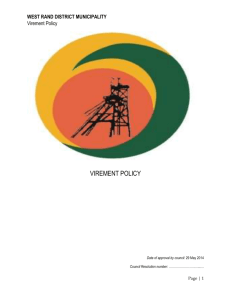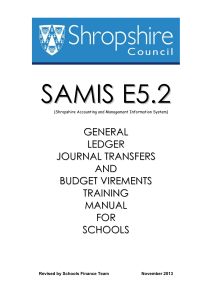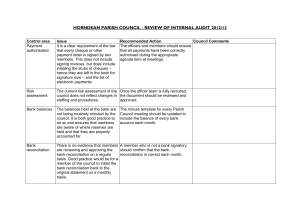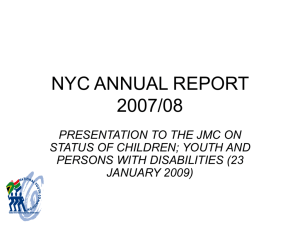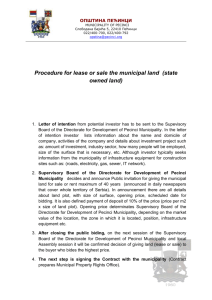VIREMENT POLICY
advertisement
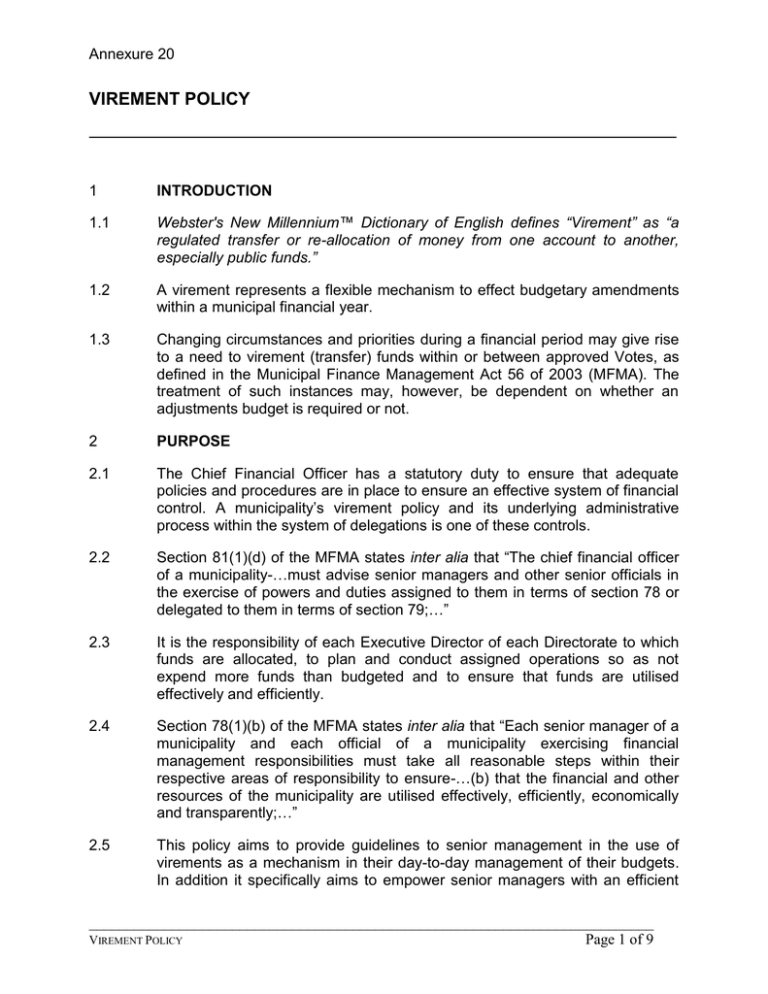
Annexure 20 VIREMENT POLICY 1 INTRODUCTION 1.1 Webster's New Millennium™ Dictionary of English defines “Virement” as “a regulated transfer or re-allocation of money from one account to another, especially public funds.” 1.2 A virement represents a flexible mechanism to effect budgetary amendments within a municipal financial year. 1.3 Changing circumstances and priorities during a financial period may give rise to a need to virement (transfer) funds within or between approved Votes, as defined in the Municipal Finance Management Act 56 of 2003 (MFMA). The treatment of such instances may, however, be dependent on whether an adjustments budget is required or not. 2 PURPOSE 2.1 The Chief Financial Officer has a statutory duty to ensure that adequate policies and procedures are in place to ensure an effective system of financial control. A municipality’s virement policy and its underlying administrative process within the system of delegations is one of these controls. 2.2 Section 81(1)(d) of the MFMA states inter alia that “The chief financial officer of a municipality-…must advise senior managers and other senior officials in the exercise of powers and duties assigned to them in terms of section 78 or delegated to them in terms of section 79;…” 2.3 It is the responsibility of each Executive Director of each Directorate to which funds are allocated, to plan and conduct assigned operations so as not expend more funds than budgeted and to ensure that funds are utilised effectively and efficiently. 2.4 Section 78(1)(b) of the MFMA states inter alia that “Each senior manager of a municipality and each official of a municipality exercising financial management responsibilities must take all reasonable steps within their respective areas of responsibility to ensure-…(b) that the financial and other resources of the municipality are utilised effectively, efficiently, economically and transparently;…” 2.5 This policy aims to provide guidelines to senior management in the use of virements as a mechanism in their day-to-day management of their budgets. In addition it specifically aims to empower senior managers with an efficient ___________________________________________________________________________ VIREMENT POLICY Page 1 of 9 Annexure 20 financial – and budgetary system to ensure optimum service delivery within the current legislative framework of the MFMA and the City’s system of delegations. 3 DEFINITIONS 3.1 Accounting Officer (MFMA) “- (a) in relation to a municipality, means the municipal official referred to in section 60; or…” 3.2 Approved Budget (MFMA) “ - means an annual budget- 3.3 (a) approved by a municipal council; or (b) approved by a provincial or the national executive following an intervention in terms of section 139 of the Constitution, and includes such an annual budget as revised by an adjustments budget in terms of section 28;” Chief Financial Officer (MFMA) “a person designated in terms of section 80(2)(a)” 3.4 Cost Centre 3.4.1 Cost centre is a cost collector which represents a logical point at which cost (expenditure) is collected and managed by a responsible cost centre owner. 3.5 Cost element 3.5.1 Cost elements distinguish between primary and secondary cost elements. Primary cost elements are expenditure items mainly generated outside the organisation. Secondary cost elements are utilised to reallocate cost by means of assessments, internal billing or activity based recoveries. 3.6 Executive Director 3.6.1 Section 56 of the Systems Act states inter alia that: “Appointment of managers directly accountable to municipal managers - (a) a municipal council, after consultation with the municipal manager, appoints a manager directly accountable to the municipal manager…” ___________________________________________________________________________ VIREMENT POLICY Page 2 of 9 Annexure 20 3.7 Financial year 3.7.1 The 12 month period between 1 July and 30 June. 3.8 Vote (MFMA) 3.8.1 “(a) one of the main segments into which a budget of a municipality is divided for the appropriation of money for the different departments or functional areas of the municipality; and (b) which specifies the total amount that is appropriated for the purposes of the department or functional area concerned.” 3.8.2 In the case of the City of Cape Town the definition of Vote is set at directorate level, with the exception being tariff-funded services as a result of their closed account nature e.g. Electricity, Water and Solid Waste. 3.9 Virement 3.9.1 The process of transferring an approved budgetary provision from one operating cost element or capital project to another within a vote during a municipal financial year and which results from changed circumstances from that which prevailed at the time of the previous budget adoption. 4 MFMA REGULATION ON BUDGET VERSUS EXPENDITURE 4.1 The MFMA regulates as follows regarding the incurring of expenditure against budgetary provisions. 4.1.1 Section 15 – Appropriation of funds for expenditure “A municipality may, except where otherwise provided in this Act, incur expenditure only- 4.1.2 (a) in terms of an approved budget; and (b) within the limits of the amounts appropriated for the different votes in an approved budget.” Unauthorised Expenditure (MFMA Definition) “in relation to a municipality, means any expenditure incurred by a municipality otherwise than in accordance with section 15 or 11(3), and includes(a) overspending of the total amount appropriated in the municipality's approved budget; (b) overspending of the total amount appropriated for a vote in the approved budget; ___________________________________________________________________________ VIREMENT POLICY Page 3 of 9 Annexure 20 4.1.3 (c) expenditure from a vote unrelated to the department or functional area covered by the vote; (d) expenditure of money appropriated for a specific purpose, otherwise than for that specific purpose; (e) spending of an allocation referred to in paragraph (b), (c) or (d) of the definition of "allocation" otherwise than in accordance with any conditions of the allocation; or (f) a grant by the municipality otherwise than in accordance with this Act;” Overspending (MFMA Definition) “(a) in relation to the budget of a municipality, means causing the operational or capital expenditure incurred by the municipality during a financial year to exceed the total amount appropriated in that year's budget for its operational or capital expenditure, as the case may be; (b) in relation to a vote, means causing expenditure under the vote to exceed the amount appropriated for that vote; or (c) in relation to expenditure under section 26, means causing expenditure under that section to exceed the limits allowed in subsection (5) of that section;” 4.1.4 Section 71(1)(g)(iii) states inter alia “(1) The accounting officer of a municipality must by no later than 10 working days after the end of each month submit to the mayor of the municipality and the relevant provincial treasury a statement in the prescribed format on the state of the municipality's budget reflecting the following particulars for that month and for the financial year up to the end of that month:…(g) when necessary, an explanation of…(iii) any remedial or corrective steps taken or to be taken to ensure that projected revenue and expenditure remain within the municipality's approved budget….” 5 VIREMENT REQUIREMENTS 5.1 The virement process represents the major mechanism to align and take corrective (financial / budgetary) action within a Directorate during a financial year. 5.2 In order for a “vote” (Directorate) to transfer funds from one cost element or capital project to another cost element or capital project, a saving has to be identified within the monetary limitations of the approved “giving” cost element or capital project allocations on the respective budgets. ___________________________________________________________________________ VIREMENT POLICY Page 4 of 9 Annexure 20 5.3 Sufficient, (non-committed) budgetary provision should be available within the “giving” vote’s cost element or project concerned to give effect to the budgetary transfer (virement). In addition, the transferring function must clearly indicate to which cost element or capital project the budget provision will be transferred to and provide a clear motivation for the transfer. 5.4 Any budgetary amendment of which the net impact will be a change to the total approved annual budget allocation and any other amendments not covered in this policy are to be considered for budgetary adoption via an adjustments budget (per MFMA Section 28). 5.5 In terms of Section 17 of the MFMA a municipality’s budget is divided into an operating and capital budget and consequently no virements are permitted between Operating and Capital Budgets. 5.6 Virements are not permissible across, or between, votes. 5.7 Virements between Trading- and Rate-funded functions are not allowed, due to the differing impacts on respective tariff- or Rates-borne services’ budgets, unless adopted via adjustment budgets (per MFMA Section 28). 6 OPERATING BUDGET VIREMENTS 6.1 Virements are not allowed to utilise special purpose budgetary allocations, adopted by Council as such and to which specific Council recommendations apply (e.g. budget strategy for growth in repairs and maintenance provisions) and which result from specific resolutions adopted when adopting the budget, as virement sources. 6.2 Sound motivations should be provided for all virements, as provided for on pro forma virement documentation. 6.3 Specific virement limitations: 6.3.1 No virements are permitted between Primary and Secondary cost elements. 6.3.2 No virements are permitted to and from Grants and Subsidies Paid, except if supported by Council decision for such transfer and as per the approved Grants-in-Aid Policy. 6.3.3 Salaries, Wages and Allowances Subjective Category: 6.3.3.1 Virements are allowed between cost elements of - and only if these virements are within - this subjective category. ___________________________________________________________________________ VIREMENT POLICY Page 5 of 9 Annexure 20 6.3.3.2 Virements to and from this subjective expenditure category are subject to the approval of the Director: Budgets. 6.3.4 Remuneration of Councillors 6.3.4.1 Virements within this category are allowed. 6.3.4.2 No virements to and from this category are allowed. 6.3.5 General Expenditure and Repairs and Maintenance (Primary) 6.3.5.1 Virements to and from cost elements within these categories are allowed (Virements are allowed from General Expenditure to Repairs and Maintenance). 6.3.5.2 The following cost elements categories are not to be used as sources of virements, but virements are allowed within each category: 6.3.5.3 ● Training related expenditure ● Bargaining Council provisions and skills development levies ● Insurance related provisions ● Pensioner and Continued Members Repairs and Maintenance No virements are allowed to and from the following cost elements or provisions: ● CIDS ● Capital Expenditure-related elements ● Scrapping of Assets / Stock ● VAT ● Insurance Fund 6.3.5.4 Repairs and Maintenance (primary) virements are to be processed via Internal Orders 6.3.5.5 Contracted Services and Collection Costs ● Virements to and from these elements are allowed. ___________________________________________________________________________ VIREMENT POLICY Page 6 of 9 Annexure 20 6.3.5.6 6.3.5.7 No virements will be permitted to and from the following expenditure categories, unless such amendments are effected within the cost element: ● Bulk Purchases ● Bad Debts ● Interest Charges and Depreciation ● Indigent Relief and Income Forgone ● Appropriation Accounts Revenue ● No virements will be approved on any Revenue element. Revenue provisions’ amendments are to be adopted via an adjustments budget. 6.3.6 Secondary Operating Cost Elements 6.3.6.1 Virements are allowed within the same cost elements. The service requestor and service provider must both endorse such virements. 6.3.6.2 Internal Utilities and Bulk Internal Utilities virements are permissible, on condition that the respective Internal Utilities Revenue and Bulk Internal Utilities Revenue are amended simultaneously. 6.3.6.3 Virements are only permitted within the same cost element in the following categories: ● Activity Based Recoveries ● Internal Utilities ● Bulk Internal Utilities 6.3.6.4 Virements may not increase the total approved budget of that cost element. 6.3.6.5 Virements are not permissible in relation to Support Service Charges. 6.3.6.6 No virements which relate to Insurance departmental premiums or Internal Capital Charges, will be permitted. ___________________________________________________________________________ VIREMENT POLICY Page 7 of 9 Annexure 20 6.3.7 Ward Allocations Projects 6.3.7.1 All conditions under ”Operating Budget Virements” section above should be met, as well as the following when virementing between ward allocation projects 6.3.7.1.1 Only virements between existing projects approved by Council, within the same subcouncil, and within the same directorate will be permitted. 6.3.7.1.2 Virements will only be considered if approved by the relevant subcouncil (subcouncil resolution) and supported by the project managers and finance managers of the projects involved (annexure D). 6.3.7.1.3 Motivations for virements between projects should clearly state the reason for the saving within the “giving” project, as well as the reason for the additional amount required. 7 CAPITAL BUDGET VIREMENTS 7.1 Only virements which relate to projects approved as part of annual or adjustments budgets, will be permitted. 7.2 No virements of which the affect will be to add “new” projects onto the Capital Budget, will be allowed. 7.3 Should a Virement cause an increase to an individual project’s total project cost, the amended total project cost must be included in the next adjustments budget or the following financial year’s draft budget. 7.4 Virements must be between projects of similar major fund sources (e.g. EFF ↔ EFF). 7.5 Implementation of the project from which funds are viremented may not be prejudiced (i.e. must not hinder completion of the project). 7.6 Motivations for virements should clearly state the reason for the saving within the “giving” project, as well as the reason for the additional amount required. 7.7 Secondary Capital Cost Elements: 7.7.1 Virements are permissible only within the same cost elements of different projects. 7.7.1.1 The service requestor and service provider must endorse such virements. 7.7.2 Proposed secondary capital expenditure virements must be approved by the Director: Budgets. ___________________________________________________________________________ VIREMENT POLICY Page 8 of 9 Annexure 20 7.8 Ward Allocations Projects: 7.8.1 Only virements between existing projects approved by Council, within the same subcouncil, and within the same directorate will be permitted. 7.8.2 Virements will only be considered if approved by the relevant subcouncil (subcouncil resolution) and supported by the project managers and finance managers of the projects involved (annexure D). 7.8.3 Motivations for virements between projects should clearly state the reason for the saving within the “giving” project, as well as the reason for the additional amount required. 8 PROCESS AND ACCOUNTABILITY 8.1 Accountability to ensure that virement application forms are completed in accordance with Council’s virement policy and are not in conflict with the directorate’s strategic objectives manifests with the head of the relevant directorate. 8.2 Completed virement documentation is to be effected by the Director: Budgets. 8.3 Virements approved and processed will be reported for information to the Executive Mayor on a quarterly basis or as part of an adjustments budget. ANNEXURES Annexure A: Operating Budget Virement Form Annexure B: Capital Budget Virement Form Annexure C: Secondary Cost Virement Form Annexure D: Supporting document to Ward Allocation virement request ___________________________________________________________________________ VIREMENT POLICY Page 9 of 9
